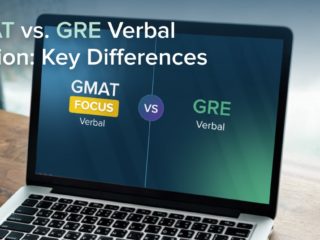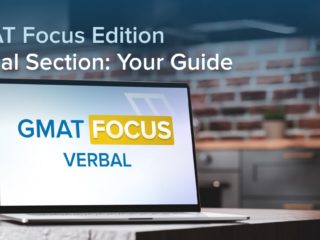| Getting your Trinity Audio player ready... |
GMAT myths and misconceptions are everywhere nowadays — anyone preparing for the GMAT exam has probably heard a few. For example, you may have heard the myth that you can’t score high on the Quant section if you’re not “a math person.” Or how about the myth that you should spend extra time on the first few questions in each section?
Believing these myths can make your GMAT prep less effective and do serious damage to your score on test day. But with so much conflicting information out there, it can be tough to separate fact from fiction.
So, we’re going to debunk 5 of the most common GMAT myths about an area of the GMAT Focus Edition that is particularly prone to misconceptions and misguided strategies: the Verbal Reasoning section. If you’ve been struggling to improve your performance on Verbal questions or you simply aren’t sure what to believe about how to properly train for GMAT Focus Verbal, this article is for you!
Here are the myths we’ll discuss:
- Myth #1: It’s Quicker to Read the Question First
- Myth #2: The Correct Answer Uses the Same Wording as the Passage
- Myth #3: “Extreme” Choices Are Always Wrong in Critical Reasoning
- Myth #4: Reading the Whole Passage Wastes Time in Reading Comprehension
- Myth #5: Verbal Questions Aren’t Precise Like Quant Questions
- Myth or Fact: Is the Actual GMAT Harder Than Practice Verbal Questions?
- GMAT Myths About the Verbal Section: Key Takeaways
- What’s Next?
Let’s debunk some common GMAT myths!
Myth #1: It’s Quicker to Read the Question First
Many test-takers believe that reading a Critical Reasoning question before they read the associated passage, or reading the first Reading Comprehension question that appears alongside a passage in GMAT Verbal, will allow them to answer the question more quickly. Generally, they believe this myth because they think that, by knowing the question, they know “what to read for.”
The problem is, when we “read for” a particular thing, we may gloss over essential pieces of information that don’t immediately seem to fit that thing. We put on blinders.
In Critical Reasoning, we may not notice a key detail or pay attention to particular word choices because we’re so focused on the words that seem to indicate the thing we’re looking for.
In Reading Comprehension, our overall understanding of the passage is likely to suffer. In both cases, we may not see how different ideas connect.
When we read a passage for the first time with the single-minded goal of finding the answer to a specific question, we are distracted readers. And when we are distracted readers, our comprehension of what we’re reading isn’t as solid.
In CR, with its deliberate wording in arguments and tricky wording in answer choices, distracted reading is a recipe for disaster.
In RC, distracted readers can end up wasting a lot of time cycling back and forth between the passage and the answer choices, no closer to understanding which choice is correct.
So, don’t fall for the myth that it’s quicker to read the question first in GMAT Verbal. To maximize your ability to efficiently eliminate answers that are clearly incorrect and identify correct answers, read the passage first.
TTP PRO TIP:
To improve your comprehension and answer Verbal questions most efficiently, read the passage first.
Myth #2: The Correct Answer Uses the Same Wording as the Passage
Many test-takers have fallen prey to the common GMAT myth that correct answers use exact wording from the passage and incorrect answers use wording that is different from the passage. If only GMAT Verbal were so simple.
The reality is that GMAT Focus Verbal questions will often try to trap you into choosing incorrect answers by making those answers appear to say what the passage says. The way they make these incorrect answers appear to repeat what the passage says is by using words and phrases that match the passage wording exactly.
Meanwhile, Verbal questions will disguise correct answers by using wording that is different from the passage wording.
Of course, GMAT Verbal is so much more than a word-matching game. It is a test of our logical reasoning and comprehension skills. So, what happens if our analysis of answer choices stays at the surface-level, where we assume that words matching those in the passage are “more correct”? We do not consistently perform well in GMAT Verbal, either on easy or more difficult questions.
If we go deeper in our analysis and make logic and meaning, instead of wording, the primary criteria for evaluating the merits of answer choices, we can avoid trap answers and greatly increase the number of questions we answer correctly.
Sure, correct answers may use some exact wording from the passage. The point is, there is no hard and fast rule that they must. Investigate the meaning of each answer choice you encounter and how it relates to what the passage says. Doing so is the only reliable route to higher GMAT Focus Verbal scores.
TTP PRO TIP:
Make logic and meaning, instead of word-matching, the primary criteria for evaluating the merits of answer choices in GMAT Verbal.
Myth #3: “Extreme” Choices Are Always Wrong in Critical Reasoning
Critical Reasoning may be the area of GMAT Verbal that is most beset by myths. Perhaps this is the case because many test-takers consider CR questions some of the most difficult questions on the exam. So, understandably, people look for “hacks” and shortcuts to make finding correct CR answers easier.
One such “hack” is eliminating any answer choices that are, supposedly, “too extreme” to ever be correct. For example, a test-taker might automatically eliminate any CR answer choices that use the word “only,” “always,” or “none.” This test-taker supposes that those words express a level of certainty that cannot possibly be correct in a CR question.
The truth is that GMAT Focus question-writers don’t make eliminating incorrect choices as simple as memorizing a list of “bad” words. If they did, then Critical Reasoning wouldn’t be much of a test of anyone’s reasoning skills!
Sure, we may eliminate certain CR answer choices because they make overly broad or extreme statements given the context of the particular question. However, there is no hard and fast rule that such statements can never be correct in any context. To determine whether a particular CR answer choice makes an overly general or extreme statement, we have to carefully analyze the question. We cannot simply hunt for a particular word that supposedly guarantees an incorrect answer.
In some cases, an “extreme” statement does what the correct answer must do. In others, it doesn’t. Thus, the “hack” of eliminating extreme choices is not a reliable strategy.
TTP PRO TIP:
The use of an “extreme” word such as only, always, or none in a Critical Reasoning answer choice is not an automatic guarantee that the choice is incorrect.
Myth #4: Reading the Whole Passage Wastes Time in Reading Comprehension
One of the most common time-management myths GMAT test-takers hear about GMAT Focus Verbal is that they should read just the first and last sentence of each paragraph in an RC passage, and then attempt to answer the associated questions.
The reasoning behind this flawed strategy is that the first and last sentences give you a snapshot of what the passage is about. Then, any details the questions ask about can just be located in the passage later as needed. The supposed purpose of this strategy is — you guessed it — to save time.
The thing is, the myth of the first and last sentence has some elements of truth to it. However, it stretches those truths to an unreasonable, unhelpful degree. Let’s look at why.
You Don’t Gain an Overall Understanding of the Passage
It’s true that the beginning and end of paragraphs tend to convey the main points of a passage. It’s not true, however, that those main points are always in the very first and very last sentence of each paragraph. It’s also not true that there are no key points conveyed in the middle of a paragraph, or that the author’s conclusion is always the last sentence of a passage, or any similar rule.
Sure, you can get a “snapshot” of what a passage discusses from first and last sentences. However, you may not get a very solid sense of how those discussions connect to each other or what the author’s views and opinions about those discussions are.
Furthermore, your overall comprehension of the passage will be lacking. And many RC questions test you on your overall comprehension. For example, primary purpose, author’s tone, and structure questions all test your understanding of the “big picture” of RC passages.
You Don’t Gain Situational Awareness
Another problem with reading only first and last sentences is that you probably will have to hunt around later for particular details for longer than you would if you had read the passage in full.
It’s true that you shouldn’t intently pay attention to every detail in a passage when you first read it. However, if you skip the details altogether by reading just the first and last sentence of each paragraph, you won’t have an awareness of where different details appear in the passage.
In other words, you won’t have the situational awareness that allows you to say, “Oh, the characteristics of the study participants were mentioned somewhere in paragraph 2.” That kind of situational awareness will allow you to go straight to paragraph 2 while other test-takers are searching the whole passage for the details the question is asking about.
When all is said and done, test-takers who simply read through the passage at the outset—not to memorize details but just for basic, overall comprehension—actually spend less time than others answering RC questions. Why? Because they have the baseline of knowledge about the passage that they need.
Other test-takers end up rereading portions of the passage over and over, searching for the information they need and trying to logically connect that information to other parts of the passage they haven’t read. As you can imagine, they also often run out of time to answer all the questions in the Verbal section.
TTP PRO TIP:
Read RC passages in full, not to memorize details but to gain an overall understanding of what the passage says and where different discussions take place.
Myth #5: Verbal Questions Aren’t Precise Like Quant Questions
Many GMAT test-takers labor under the misconception that Verbal questions are not “precise” like Quant questions are. These test-takers tend to have beliefs such as the following:
- Correct answers to Verbal questions are subjective.
- Correct answers to Verbal questions are based on the question-writer’s opinion.
- In many cases, getting a Verbal question correct is a matter of luck.
When answering Verbal questions, these test-takers are more prone to guessing, going with what “sounds,” “seems,” or “feels” right, or just plain giving up than other test-takers are. Unsurprisingly, test-takers who use such haphazard strategies have a lot of trouble achieving high scores in GMAT Focus Verbal.
Of course, we can’t use equations or calculations to solve Verbal questions, as we can for, say, Problem Solving questions in the Quant section. However, we can still point to clear, specific reasons why each answer choice in a Verbal question is correct or incorrect, just as we can with choices in any Quant question.
In Critical Reasoning, a choice may weaken an argument when we need a strengthener. In Reading Comprehension, a choice might contradict what the passage says is true. In neither of those cases is the error a matter of opinion. Moreover, eliminating those incorrect choices would be a matter of luck only if we weren’t trained to spot such errors.
The truth is, whatever the Verbal question type, there is always one or more specific things we can point to that makes an answer choice correct or incorrect.
TTP PRO TIP:
To consistently get GMAT Verbal questions correct, pinpoint concrete, specific reasons why answer choices are correct or incorrect.
Myth or Fact: Is the Actual GMAT Harder Than Practice Verbal Questions?
Many GMAT students worry that they’ll underperform on test day because Verbal questions on the actual GMAT Focus Edition are generally or inherently harder than practice Verbal questions.
The truth is, there is nothing inherently easier about practice Verbal questions. For example, it’s not true that RC passages on the GMAT Focus are always more difficult than practice passages—a common misconception.
That said, whether your practice questions match the GMAT’s difficulty depends on what resources you use for your GMAT prep. For example, the Target Test Prep GMAT Focus Course contains thousands of realistic Verbal, Quant, and Data Insights practice questions meticulously crafted by experts with years of experience analyzing the ins and outs of how GMAT questions work.
So, look for a reputable resource that gets great reviews from past GMAT students whose study resource prepared them well to handle the Verbal questions they saw on test day. And when you sit for full-length practice tests in the final stages of your GMAT prep, be sure to use official tests from mba.com. Those tests mirror the real GMAT Focus. So, your performance on them will show you whether you’re prepared to hit your Verbal score goal on test day.
Check out this article for more GMAT Verbal practice tips.
TTP PRO TIP:
Prepare for the GMAT Focus using a reputable study resource to ensure that the Verbal questions you practice with match the difficulty level of actual test questions.
GMAT Myths About the Verbal Section: Key Takeaways
Here are the 5 common GMAT myths we discussed in this article, and the truth about them!
Myth #1: It’s quicker to read the question first.
Reality: To improve your comprehension and answer Verbal questions most efficiently, read the passage first.
Myth #2: Correct answers use the same wording as the passage.
Reality: Make logic and meaning, instead of word-matching, the primary criteria for evaluating the merits of answer choices in GMAT Verbal.
Myth #3: “Extreme” choices are always wrong in Critical Reasoning.
Reality: An “extreme” word such as only, always, or none in an answer choice is not an automatic guarantee that the choice is incorrect.
Myth #4: Reading the whole passage wastes time in Reading Comprehension.
Reality: Read RC passages in full, not to memorize details but to gain an overall understanding of what the passage says and where different discussions take place.
Myth #5: Verbal questions aren’t precise like Quant questions.
Reality: To consistently get Verbal questions correct, pinpoint concrete, specific reasons why answer choices are correct or incorrect.
What’s Next?
Learn what the 5 most common GMAT Verbal mistakes are and get expert strategies for scoring high on the GMAT Focus Verbal section.
Need advice on acing Quant? Check out our top 10 Quant preparation tips.



